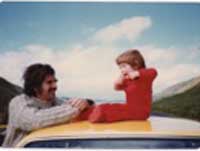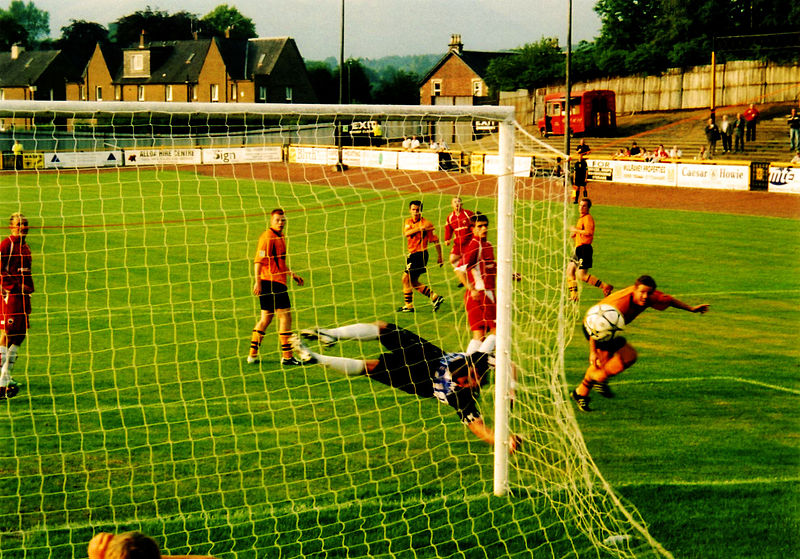Richard Lutz continues his early assault on the world of journalism as a cub reporter.
I was outside the home of footballer Alan Hansen’s family, in the small mining village of Sauchie. It was the summer of many decades ago.
A young Alan had got himself into what a magistrate called “ungallant behaviour” on Blackpool beach just after joining Liverpool. It had made the papers. My job was to find out how the parents would react – a common job in any journalist’s life.
“How do you feel about…?” And then fill in the template.
I knocked. A door opened and his father answered. There was a pause. Mr Hansen knew pretty well why I was there.
That pause. You never know what will happen on a doorstep – especially when a protective parent is approached. He looked me up and down and then broke into a wan smile, invited me in and gave me a fatherly, dignified interview, and also a cup of tea. It made my paper, the twice weekly Alloa Advertiser, as well as the London papers too.
My life and times at the ‘Tizer – my first newspaper job in Britain and one that wrung out the rough bits and the inexperience before I moved on, to daily papers and then to TV. A year before, I was on a building site mixing cement. Jack Hardy, the owner of the Advertiser, had gallantly taken a chance on me and I had happily exchanged shovel for shorthand.
For a glorious £48 per week (more than as a construction worker), I was shown the windowless reporters’ room with its Dickensian desks and bad lighting, made to sit in night class for my Pittman’s shorthand along with apprentice secretaries hoping to get up to the 100 per minute minimum and quickly rammed Scots law, council procedure and the grammar and rhythm of journalism into my brain.
After banging on the portals of international journalism with my first story about a woman who was knocked off her bicycle, I clocked that every reporter needs a patch. A stake in something, a beat, a corner to spread wings.
Gordon Gillies, our ’chief reporter’ was an Alloa lad and knew everyone. He was a perpetual motion machine who gobbled up all reasonable stories and hammered them out. Then he’d go into the composing room and help lay out the front page with his exclusive. He was a whirlwind, was Gordon. He ate stories for breakfast. I looked around.
I tried courts for a while with its arcane Scots procedures: judges were sheriffs, prosecutors were procurator fiscals and a case could be ‘not proven’ (my guess was that was when a defendant couldn’t be found guilty but they knew he was). I continually heard the summing up by Sheriff Henderson when he laid down the law to an unemployed miner from Alva (no fixed abode) who had gone on a week end drunken rampage:
“You need a short sharp lesson, Johnstone.” he would intone as he scratched his wig on the bench and re-read damning social enquiry reports. “Short sharp lesson.” I quickly learned how to scratch that phrase into shorthand real fast. He used it daily.
I soon realised that most of the reporters ran a mile when councils were mentioned: local Clackmannshire District Council (representing our wee county shoved unlovingly between Fife and Stirlingshire) or the overarching Central Regional Council based in sophisticated Stirling down the road. That was where good stories were cooking. But, unfortunately, there were the council meetings, mind-numbing, tedious, meandering, with tiresome local politicians and po-faced officials. Quickly, I found out that gems lay bubbling underneath.
I decided to call this patch my own. Gordon thought I was mad. Mr Sweet, the editor, was, I think, glad to get me out of the office.
And it was in the council, laden with revenue expenditure rows, daily bunfights between old Labour and the nascent SNP and unfathomable ‘debates’ about road closures and school finance, that things were revealed and ripe for print. One story especially stood out. One of our own Alloa councillors, a straight talking ex-miner called Sam Ovens, had questioned how his fellow councillors had suspiciously okayed a dubious plan where senior council officials would receive half price mortgages (at 5% rather than 10%pa).
Sam would not leave it alone. His own ruling Labour Party was furious that he was questioning their dubious decision; the senior officials had their in-house lawyers confirm it was all above board and the national press, led by a relentless newshound from the Edinburgh Evening News called Colin Liddell, would just not let it go.< Mr Sweet could not see why ‘our county’ would be interested. I reminded him that Cllr Ovens, though governing in distant Central Regional Council in faraway Stirling, represented a Clackmannanshire ward (and readers). He let the copy flow on that note.
Well, the suspiciously supine councillors approved the mortgage deal, the officials got their cheap loans, the shambolic SNP kept quiet to avoid the moral heat, the press moved on to the next story and allowed Central Region to slip back into the back eddies of Scottish politics. I stayed to come up with story after story that was off the agenda.
The Labour leader on the regional council was a toughened old pol called Tom Gilmour. He was a big bellied hard man who wore well-made suits, smoked incessantly, ruled the roost with a tight fist and, I can’t forget this, wore white shiny loafers. He could have been a hit man for Tony Soprano. Well, in all honesty, he probably raised pink nosed Maltese terriers, was an award-winning clematis grower and read stories to disabled orphans on Christmas Eve. But he did look hard, talked hard, acted really hard. His whole body seemed architected to stand guard at the end of a bar with a cigarette and a double whisky (no ice)
It was he who one day took a note while in the debating chamber, cigarette in hand, and actually broke a sliver of a smile. He handed it to a lower form of Labour councillor and nodded. The note came to the press desk. Harold Wilson had quit.
Cllr Gilmour, florid face ever more puce, was already adding up numbers how this would hit his local power base and, more importantly, the ‘high headjuns’ down in Glasgow and London. He was a back room muscleman, a conniver from the old school. He was party politics of the old school.
And speaking of distant London, the local MP back in Alloa was of another breed. He was George Reid, a dapper, tiny framed SNP politician. He had formally worked overseas and whenever I would come into his office for a tidbit or a quote, if he was on the phone, he would start speaking Russian to an unseen pal. Once, he admitted, it was Bulgarian. Lord knows what that was about.
George had a free hand on his weekly columns in the ‘Tizer. He knew which end of a typewriter was up, having been on Fleet Street and the TV investigative show World In Action. One day he swanned into our office to announce to ever-pliable Mr Sweet that his weekly column, elegantly called Quid Pro Quo, would be re named Tit for Tat. Mr Sweet had the temerity to ask the reason. “This is Alloa,” he reminded an obsequious Mr Sweet. “It’s Tit for Tat.”
It was the first and last time that I have ever seen a writer tell an editor what to print, how to headline it or how to produce it. To say the least, MP George’s copy was never touched, sub-edited nor questioned. But then again, it was pretty good anyway.
Ultimately, Mr Reid’s wheels came off in a Labour victory. He went to the Red Cross for a while and later emerged as an SNP father figure with the newly set up Scottish Assembly. I met him 20 years later in another life when I was at a Glasgow editorial conference representing Birmingham’s Central TV. Reid had put on forty pounds in weight after a post-Alloa life of good living. “I thought you’d leave Scotland and head south,” he said slowly, knowingly, conspiratorially. “Everyone does.”
Anyway, back to the ‘Tizer and I slapped story after story into the paper from the dry bones of council meetings. I would try to keep awake in the suffocating vapidity of the meetings. Usually, after my fellow local reporters had left the chambers, I would talk to those left behind – councillors having a smoke, pallid officials having a smoke, shifty press officers (all ex-reporters) having a smoke. Tom Gilmour having a smoke. Everyone having a smoke.
But there were still rough edges, steep curves, deep holes to deal with. One was sport coverage. Everyone had to do it. It was an obligatory newsroom operation. and it also earned ‘lineage,’ which meant all income from selling on the results were slapped in a pool and doled out equally.
Most of the work centred around filing copy about Alloa Athletic, a team who usually bumped along near the bottom of one of the lesser divisions during my time. Football played an overwhelming part in this sport lineage. Growing up outside Britain, I had no idea about Alloa Athletic. Nor Rangers, Celtic or Raith Rovers for that matter. But I had to help cover it – and, shockingly, had to file for the papers. I defaulted to basketball cliché to get by, giving heart attacks to Daily Record and Glasgow Herald copytakers as I described how McNulty “rifled a rocket cross on a pick option to make no mistake from five yards out”
The first time I snuck into the press box, which stood on top of a rickety stand at Recreation Park (aka: The Recs), I watched as real football reporters would sneak a tiny notebook from their side pocket, light a Rothmans and write a minsecule note: “McMinn, bad knee…”, “Oliver, slow on the right,” then produce the next day 350 words of mighty prose about the Alloa clash versus Stenhousemuir or a drubbing at the hands of Motherwell.
I was out of my depth. But it was here in The Recs that I witnessed one of the most whacko goals ever 0 an early experience which I thought normal. The Alloa goalie booted the ball downfield, it hit a stone and bounced high over the heads of the opposing defence and goalie. Go-laaaa!!!!! 1-0.
I think the reporters in the ramshackle Rec Park press box fell off their barstools. “Well,” I asked. “What do we do with that one?” Shouldn’t have asked. Out came the tiny notebooks- “McConachie…unbelievable.” “Alloa hits the rocks – and win”.
Meanwhile, the torrent of local stories passed my desk, helping me to quicken my pace, polish for what passed for style: “Row Over Dollar Glen Safety,” “Big Row over Save Mar Tower Plan,” “Even Bigger Row Over Brewery Closure” and “Biggest Row Ever Over Hillfoots Road Dangers” Plus one of my all-time favourites: “Bay City Rollers to Move to Dollar.” (they didn’t).
The Advertiser knocked the rough edges off us all. And many of my colleagues did well. John Knox became a trusted BBC voice covering the Scottish Assembly; Jennifer Cunningham became a dab hand at features for the Glasgow Herald; Anna Soubry is now a Tory minister; Alison Tod worked for the World Service; and Arthur MacDonald went to The Scotsman’s business desk. Gordon Gillies, I heard, became a press officer for the gas board.
So, after a quick tour of duty at The Advertiser, where I learned so much, I was at the front door of the Hansen home, a last doorknock, one of my last stories for the paper.
I returned to the Dickensian newsroom and handed in my notice. Another job loomed. Mr Hardy, the owner of the ‘Tizer, reminded me I was imprisoned under a contract called indentures. It summoned up medieval images of a shackled man lifting logs for seven years before being allowed to sleep under a roof or eat with a fork. It meant I had to serve two and a half years as a trainee. I told him I was still leaving. And I left.
Then it was down the road, away from Alloa, away from Judge Henderson and his short sharp lessons, away from gentle flummoxed Mr Sweet, away from squabbling councillors, away from The Recs, away from Clackmannanshire. Away from the ‘Tizer.
Next: My life and high crimes as a freelance






On The Catholic Pictorial – the archbishop would come in to the office and celebrate mass. No kidding.
I hid in the darkroom with the snappers.
Chuckling out loud at newsroom memories